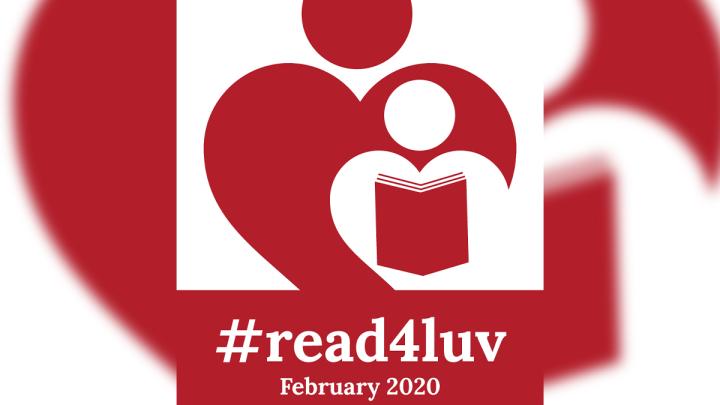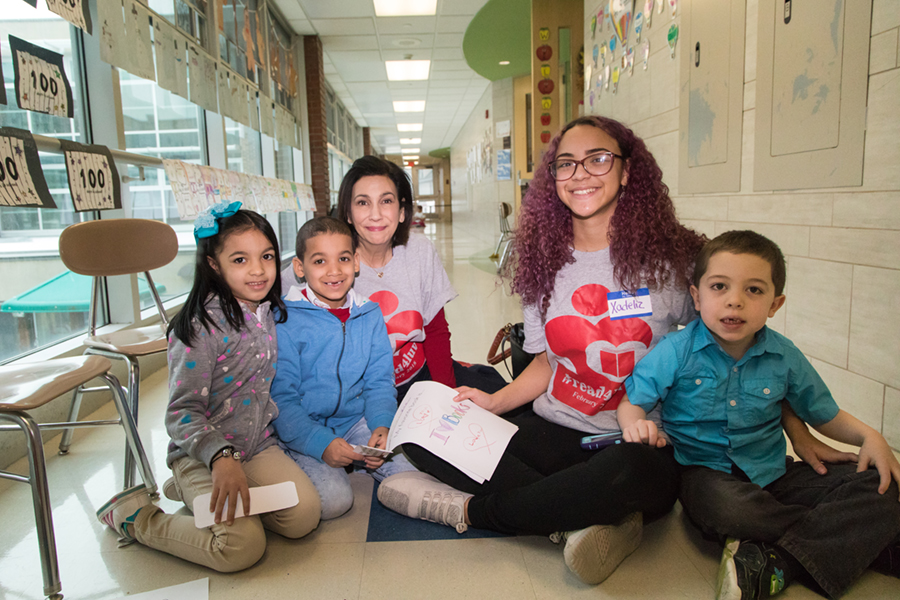
Social media campaign celebrates the value of reading aloud to kids
On February 1, the University of Rochester’s Warner School of Education will run a month-long social media campaign to promote the importance of reading aloud. The annual What Are You Reading? campaign encourages readers to document, share, and tag photos of books read aloud to children, using the hashtags #Read4Luv and #WhatIAmReading. Throughout the entire month of February, people are also encouraged to share posts and photos of their favorite childhood books.
Many families enjoy the tradition of a bedtime reading ritual. By reading with a child before sleep, Warner School associate professor Carol Anne St. George says that we are bringing a pleasant closure to the day and supporting happy dreams and a good night’s sleep.
“Bedtime story routines help children feel safe and secure, and promote family bonding,” St. George says. “However, bedtime is certainly not the only time to enjoy reading together.”
Reading aloud with children of all ages—even after they can read—is one of the most important elements in literacy development. Research demonstrates that reading together benefits children in many ways, including building vocabulary and background knowledge, igniting enthusiasm for learning, and developing a life-long love for reading. Setting aside a block of 15 minutes a day to reading together yields impressive results for everyone involved. It also creates a positive bond between parent/caregiver and child.
St. George, a literacy expert, offers the following tips for reading together with children:
- Make the read-aloud an enjoyable experience. Snuggle up, relax, and have fun. Take time with a page, and point out pictures and other print features. Children may want to take an active part by turning the pages when you read or being responsible for reading/saying aloud certain words within the story.
- Select a wide variety of books, genres, and illustration styles.
- Read with expression. Use funny voices for the different characters and sounds in the text.
- Fluctuating your pace—reading faster or slower—can help if your child becomes distracted. Your child may want to draw while you read or act out portions of the story. As your child gets older, increase the length of time reading together and the complexity of the story.
- Children may want to hear the same story over and over, and that’s fine. Though it might challenge the patience of the adult, children still reap benefits from repeat readings of the same book.
- Conversations about the story may be helpful in maintaining interest. Ask your child to make predictions about what is going to happen next. Make connections between the story and your child’s life. Ask if a character in the story reminds them of someone they know or would like to know. Ask who their favorite character was or how the story could end differently.
- With family story time, older children can participate by taking a turn reading. Listening to a story together grounds families and offers a shared experience to relate back to. It is a misconception that children outgrow the benefits of reading aloud. Indeed, all ages can benefit from being read to.

The social campaign, which first launched in 2017, has promoted the value and need for reading aloud to children of all ages, including babies. For the past three years, people have been invited to help nurture the love that grows with reading on Valentine’s Day and every day. The annual campaign continues to yield many posts and photos of people sharing books and their enjoyable experiences of reading together, as well as to help kids “fall in love” with reading.
To help support this literacy effort and show the value of reading aloud, graduate students and faculty from the literacy teacher education program at the Warner School are organizing efforts that will bring high school students in the Teaching and Learning Institute (TLI) at East Upper School to Audubon School No. 33 on Wednesday, Feb. 12 to read books to elementary students at the school.
Throughout the month of February, people are encouraged to share photos of the books they are reading aloud with children—or even some of their own favorite childhood books—on social media (Facebook, Instagram, and Twitter) using the hashtags #Read4Luv and #WhatIAmReading.
Editor’s Note: Carol St. George is available for interviews to discuss the importance of literacy and to share how families can support literacy development at home.